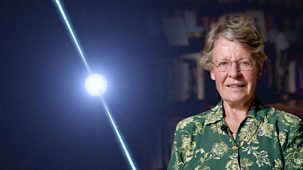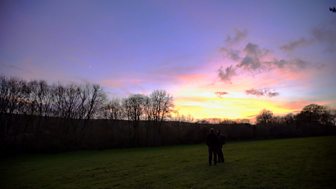
Secrets of the Red Planet
Could life have once thrived on Mars? What mysterious force is moving large boulders across its dusty surface today? And will a return trip to our neighbouring planet ever be possible? In this exciting episode, we're blasting off to uncover what the latest research is revealing about the Red Planet.\n\nIt's been 60 years since Mariner 4 sent back the very first images of another world from space. Since then, a fleet of orbiters and rovers have been exploring Mars, uncovering a dramatic history that may not be so different from our own planet Earth. \n\nIn the water-rich landscapes of Scotland, Maggie Aderin-Pocock meets Lonneke Roelofs from Utrecht University, who’s been investigating the puzzling movement of enormous Martian boulders. On Earth, such motion would usually be connected with water - but on Mars, something entirely unexpected is at play. And in studying it, scientists have discovered a brand new geological phenomenon. \n\nMaggie also visits the University of St Andrews to meet Dr Claire Cousins, who is looking at ancient Scottish rocks to help future Mars rovers identify and analyse similar formations - ones that might contain microscopic evidence that life once existed on the Red Planet.\n\nWhile Maggie has journeyed north, Chris Lintott is on a virtual field trip to Mars itself with Professor Sanjeev Gupta at the Data Observatory at Imperial College London. Dr Gupta takes us on a tour with NASA’s Perseverance rover, and the incredible insights the modern rovers are providing about Mars’s history and surface today.\n\nMeanwhile, guest presenter Dr Mekhi Dhesi talks with Dr James Lambert from Pulsar Fusion about the current propulsion options used for space travel. They discuss a possible alternative approach that could reduce travel times and costs, making a mission to Mars, and back again, one step closer. Return missions to Mars could deliver samples from the Martian surface back to Earth laboratories for in-depth analysis and maybe even permit human travel to Mars one day. \n\nPete Lawrence is at the Milton Keynes Astronomical Society to talk us through Mars observations and what other cosmic wonders to look out for in the lighter summer night skies. \n\nTake a trip with us to discover the secrets of the Red Planet and how we are getting closer and closer to discovering evidence of life on Mars.
Source: BBC 4
Most recent episodes of The Sky at Night
The Sky At Night
Space Mysteries: The Sky At Night Meets Curious Cases
Do aliens exist, and can we talk to them? What does a black hole sound like? Does the universe look like a doughnut? In a spectacular season finale, The Sky at Night teams up wi ...
13-11-2025
BBC 4
The Sky At Night
Brits In Space
Three, two, one, lift off! This edition launches into the extraordinary - and extraterrestrial - world of astronaut training, discovering what it truly takes to become a Europea ...
15-10-2025
BBC 4
The Sky At Night
The Expanding Universe
The team explores one of the greatest discoveries of modern astronomy - that our universe is expanding - and the new questions it raises about how the cosmos works.\n\nIn the 19 ...
10-09-2025
BBC 4
The Sky At Night
Queen Of Pulsars
Dame Jocelyn Bell Burnell is a discoverer and an explorer of the distant cosmos, and she has walked among the stars. She discovered the first pulsar in 1967 - a discovery so imp ...
14-08-2025
BBC 4
The Sky At Night
Exoplanets - Strange New Worlds
The team go on a cosmic adventure, exploring one of the newest areas of modern astronomy – the search for exoplanets, the distant bodies that orbit stars beyond our own so ...
16-07-2025
BBC 4
The Sky At Night
Greenwich: A Journey Through Space And Time
To celebrate the 350th anniversary of the Royal Observatory, the team recreate history. \n\nIn the times of the early Astronomers Royal, scientists would gather at spectacular d ...
12-06-2025
BBC 4
The Sky At Night
Secrets Of The Red Planet
Could life have once thrived on Mars? What mysterious force is moving large boulders across its dusty surface today? And will a return trip to our neighbouring planet ever be po ...
15-05-2025
BBC 4
The Sky At Night
Asteroid Strike?
The team explore one of the biggest stories in space news, the ‘city killer’ asteroid 2024 YR4. First observed on 27 December 2024, it soon became one of the biggest ...
17-04-2025
BBC 4
The Sky At Night
Ancestral Skies
This month, The Sky at Night teams up with BBC Ideas to discover the secrets of archaeology and astronomy and to reflect on our ancestral skies. \n\nThroughout history and acros ...
14-11-2024
BBC 4
The Sky At Night
Question Time Special
Get ready for The Sky at Night’s annual Question Time Special, where viewers get the opportunity to ask the questions they have always wanted answered about our universe.\ ...
08-10-2024
BBC 4
Most popular episodes of The Sky at Night
The Sky At Night
Question Time Special
A special Question Time edition of the programme, recorded at the University of Exeter as part of the British Science Association’s Science Festival.\n\nThe panel is chair ...
12-10-2023
BBC 4
The Sky At Night
Wonders Of The Night Sky
The Sky at Night celebrates one of the most profound, moving and enjoyable activities there is - the ancient art of looking up, studying and marvelling at the night sky. The pro ...
10-12-2017
BBC 4
The Sky At Night
Telescope Takeover
The team travel to the island of La Palma in the Canary Islands where they take control of some of the world's largest telescopes to view the most spectacular sights in the nigh ...
12-02-2017
BBC 4
The Sky At Night
How Gravity Shapes The Universe
The team travels to the Brecon Beacons AstroCamp to see how gravity shapes the universe. Chris finds out about the newest moon in the solar system.
18-05-2014
BBC 4
The Sky At Night
Dark Skies
Dr Maggie Aderin-Pocock and Professor Chris Lintott visit the Van Gogh Immersive Experience to seek inspiration in one of the world’s most famous works of art, Starry Nigh ...
12-01-2022
BBC 4
The Sky At Night
The Brightest Star
The team explore stargazing in the daytime, show how seasons change on other planets across the solar system and examine what makes the sun special.
13-07-2014
BBC 4
The Sky At Night
Mapping The Milky Way
The Gaia space telescope is not just create the ultimate star map of the Milky Way. It is also showing us our galaxy's past and how it will change in the future.\n\nThe Sky at N ...
12-05-2021
BBC 4




















